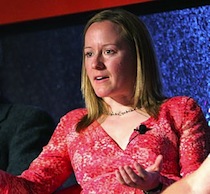 Life Sciences
Life Sciences
At NASA, Another Crack in the Darwin Consensus?
 Following our report about a new openness in Asia to critics of Darwinism, another crack in the Darwin consensus has appeared in an unexpected place: NASA.
Following our report about a new openness in Asia to critics of Darwinism, another crack in the Darwin consensus has appeared in an unexpected place: NASA.
Susan Mazur is one of a few science reporters who have defied the neo-Darwinian code of silence by reporting about evolutionists with differing views (see, for instance, here). Now posted by NASA’s Astrobiology Magazine, her interview with Maggie Turnbull (left) gets downright daring.
Turnbull, with a PhD in astronomy, describes herself as a “freelance astrobiologist.” Somewhat detached from the hierarchy, Turnbull didn’t seem flustered at all by Mazur’s probing questions. Once you scroll past the iconic pictures of SETI champion Jill Tarter and Darwin promoter Carl Sagan, you find some interesting dialogue.
Suzan Mazur: As an independent astrobiologist what is your affiliation with NASA?
Maggie Turnbull: I started a small non-profit, non-academic organization here in Antigo several years ago called Global Science Institute. I have a cooperative agreement with NASA for research related to questions NASA is interested in.
Suzan Mazur: NASA’s official definition for life is no longer still limited to “a self-sustained chemical system capable of undergoing Darwinian evolution,” is it?
Maggie Turnbull: All I can say is, if NASA has an official definition of life, I don’t agree with it, and neither does life.
Suzan Mazur: Would you know if NASA is still financing and otherwise supporting research pegged to the Darwinian model?
Maggie Turnbull: I don’t know exactly what you mean by “pegged to the Darwinian model.” NASA supports research in genetics and in mechanisms that allow for survival in extreme conditions.
It’s really all about our collective desire to investigate things and the technology catching up as well as our understanding of how the universe works. Scientists in many ways are their own worst enemies. There’s so much disagreement in the scientific community because of all the objectives being pursued simultaneously. Often the result is a loss of focus. Scientists end up rehashing the same questions and the mission disappears.
Mazur queries Turnbull on her feelings about the Darwinian model:
Suzan Mazur: Funding of origin-of-life research pegged to the Darwinian model is increasingly a contentious issue because Darwinian science is being marginalized by a growing number of responsible scientists. There’s a schism between the neo-Darwinists on one side and on the other many of the evo-devo scientists, symbiogeneticists, geologists, mechanical engineers, natural scientists, cognitive scientists, linguists and others. Would you comment?
Maggie Turnbull: I don’t know much about it. I’m really an astronomer at heart. My focus is on the stars. I have very simple objectives when it comes to finding habitable planets and whatever the biologists want to say about the evolution of life is fine with me. At the end of the day though nothing matters until we find it.
Suzan Mazur: Until we find what?
Maggie Turnbull: Until we find life on another planet.
Suzan Mazur: So you don’t think that much about origin-of-life issues.
Maggie Turnbull: I think about origin of life, but personally I’m more interested in exploring other environments and finding out whether there are life form systems there. Evolutionary biologists would get a lot out of that search as well. I’m looking for the variety of life in the universe.
Suzan Mazur: Harvard’s origin-of-life researchers headed by Martin Nowak have angled their experiments to Darwinian evolution and recently confirmed that the conditions of early Earth cannot be duplicated. Would you comment?
Maggie Turnbull: I’m generally interested in what people have to say about origin of life, but it is not my research area. I prefer not getting into a debate about it.
Having deftly dodged the debate about Darwinism and origin-of-life research, Turnbull did admit that “consensus science” has a self-serving sociology that can be oppressive:
Suzan Mazur: How much of science would you say is social momentum, i.e., not objective?
Maggie Turnbull: I would say a lot of it is social momentum because science is about a community of thinkers. By thinkers I mean scientists as well as non-scientists. Because when the American public is keenly interested in something, it is much easier for Congress to make the case for funding it. What scientists want, however, often does not concur with what the public wants. I don’t mean to be harsh in saying this, but the truth is that when scientists want to do what they want to do, they try to sell it as something the public should care about.
It takes so long to get a PhD and to build a career in science. Once that’s achieved, a scientist is hemmed-in as far as what they’re expert at and able to work on. A scientist can’t easily reorient their research just because the American public wants to study something else. So scientists try to persuade Congress to pay for the research they want because that’s what they know how to do. Scientific progress thus is 99% a wait for consensus.
It may just be a hairline crack, but it is a visible one. NASA allowed a critic of neo-Darwinism to interview an astrobiologist. Mazur got her to admit that (1) a consensus exists that the public may not really care for, (2) scientists often try to sell their interests in a form that’s been massaged to look like “what the public wants,” and (3) that “whatever the biologists want to say about the evolution of life” doesn’t really matter until scientists actually find life around another star.
As for whether life should be defined as something that undergoes Darwinian evolution, Turnbull’s courageous wording is refreshing: “If NASA has an official definition of life, I don’t agree with it, and neither does life.”
